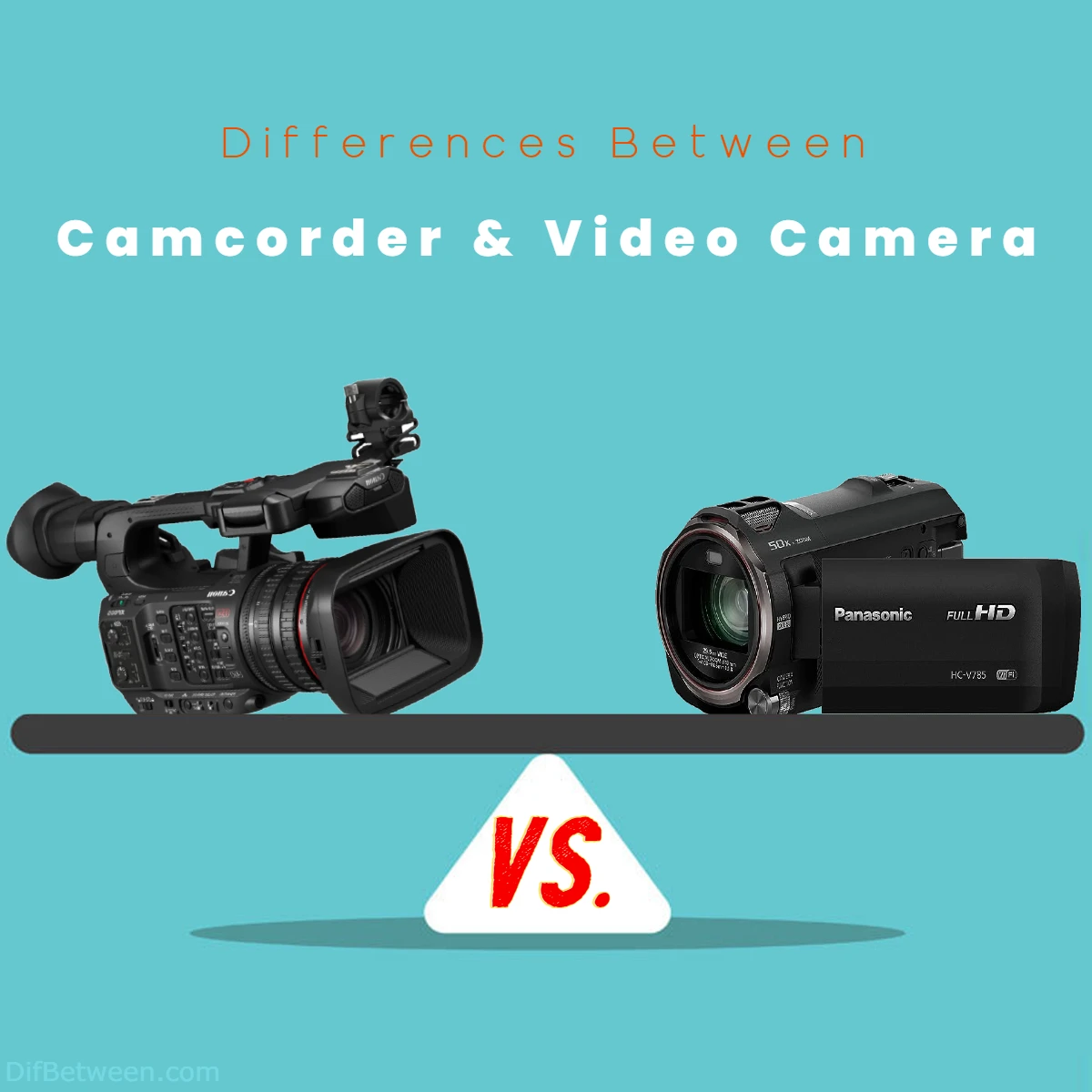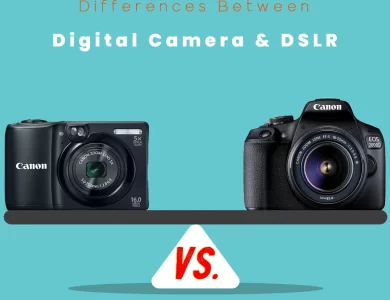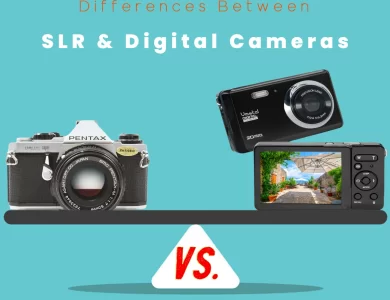
| Aspect | Camcorders | Video Cameras |
|---|---|---|
| Design and Form Factor | Compact and integrated design | Diverse range of form factors |
| Lightweight and portable | Ranging from handheld to pro setups for different preferences | |
| All-in-one unit with lens, viewfinder, and microphone | ||
| Versatility and Features | User-friendly interface | Manual controls for precision |
| Integrated design | Interchangeable lenses | |
| Convenient for amateurs | Suitable for various production environments and creative projects | |
| Limited manual controls | ||
| Restricted creative options | ||
| Image Quality and Performance | Smaller image sensors | Larger sensors for better image quality |
| Limited manual settings | ||
| Suitable for casual use | Enhanced performance in low-light conditions | |
| Audio Capabilities | Built-in microphones | External microphone inputs |
| Captures clear audio | Audio level controls | |
| Suitable for casual use | Professional-grade sound recording | |
| Low-Light Performance | Smaller sensors struggle | Better low-light performance |
| Grainy/noisy footage in low light | Clearer footage in dim lighting | |
| Editing and Post-Production | Minimal post-production tweaks | Greater flexibility for |
| Flexibility | Streamlined workflow | editing and creative effects |
| Limited customization options | ||
| Storage and Media Options | Built-in memory storage or SD cards | Multiple memory card slots and |
| Limited storage capacity | external recording options | |
| Ample storage for extended | ||
| shoots and high-res formats | ||
| Connectivity and Networking | Basic options for transferring | Advanced connectivity options |
| Features | Limited networking capabilities | for real-time sharing and streaming |
| Price Range and Investment | More budget-friendly | Wide price spectrum from consumer to professional models |
| Conclusion | Simplicity and portability for capturing everyday moments | Control, versatility, and artistic prowess for enthusiasts and professionals |
In the fast-paced world of recording memories and creating visual content, two stalwarts stand tall: the trusty camcorder and the versatile video camera. While these devices share a common goal – capturing moving images – they each possess unique attributes that set them apart. In this comprehensive guide, we’ll take you on a journey through the key differences between camcorders and video cameras, helping you make an informed choice for your creative endeavors.
Differences Between Camcorder and Video Camera
The main differences between a camcorder and a video camera revolve around their design and features. Camcorders are compact and user-friendly, ideal for capturing everyday moments with ease. In contrast, video cameras offer greater creative control, boasting manual settings, interchangeable lenses, and superior image quality, making them a preferred choice for enthusiasts and professionals seeking to achieve cinematic depth and visual excellence.
1. Design and Form Factor
When it comes to design, camcorders and video cameras flaunt varying aesthetics. Camcorders, often compact and lightweight, are designed with convenience in mind. Their integrated design typically features a lens, viewfinder, and microphone, all packed into a single unit. This makes camcorders a go-to choice for users seeking portability and ease of use. In contrast, video cameras exhibit a more diverse range of designs. From handheld units resembling camcorders to larger setups reminiscent of professional movie cameras, video cameras offer a spectrum of choices catering to different preferences.
Camcorders’ streamlined design makes them a preferred tool for casual videographers and beginners who prioritize simplicity. On the other hand, video cameras’ diverse form factors cater to both amateur enthusiasts and seasoned professionals seeking specialized features for their projects.
2. Versatility and Features
Diving deeper, it becomes evident that the disparity between camcorders and video cameras extends to their functionalities and features.
Camcorders:
Camcorders excel in simplicity, often offering features tailored for hassle-free recording. Their automatic settings and user-friendly interfaces make them ideal for capturing family gatherings, vacations, and everyday moments. However, this simplicity can limit creative control for more advanced users and projects. Camcorders often prioritize features like image stabilization, long battery life, and built-in memory storage, ensuring you’re ready to record at a moment’s notice.
| Pros of Camcorders | Cons of Camcorders |
|---|---|
| ✔️ User-friendly interface | ❌ Limited manual controls |
| ✔️ Integrated design | ❌ Restricted creative options |
| ✔️ Convenient for amateurs | ❌ Not suitable for high-end use |
Video Cameras:
Video cameras, with their broader range of capabilities, cater to a wider spectrum of users. Professionals and enthusiasts alike gravitate towards video cameras for their manual settings, interchangeable lenses, and advanced shooting modes. These cameras empower creators with greater control over exposure, focus, and artistic aspects of their footage. The ability to use external microphones, lights, and accessories enhances the production quality of video camera recordings.
| Pros of Video Cameras | Cons of Video Cameras |
|---|---|
| ✔️ Manual controls for precision | ❌ Steeper learning curve |
| ✔️ Interchangeable lenses | ❌ Heavier and bulkier |
| ✔️ Suitable for various production | ❌ Potentially expensive |
| environments and creative projects |
3. Image Quality and Performance
When it comes to capturing vivid imagery and pristine videos, the distinction between camcorders and video cameras becomes even more pronounced.
Camcorders:
Camcorders emphasize ease of use and are geared towards capturing clear and steady footage. They often prioritize features like optical image stabilization to counteract shaky hands and movement. While camcorders deliver satisfactory image quality for casual use, their smaller image sensors and limited manual settings might fall short for projects demanding cinematic depth and visual richness.
Video Cameras:
Video cameras, on the other hand, cater to the discerning eye, with larger sensors that capture more light and detail. This translates to superior image quality, especially in challenging lighting conditions. Their manual controls enable users to fine-tune settings like aperture, shutter speed, and ISO, resulting in a wider creative canvas. This makes video cameras the weapon of choice for professionals seeking exceptional visual aesthetics.
4. Audio Capabilities
In the world of videography, sound quality is as vital as visual appeal. Let’s explore how camcorders and video cameras differ in their audio capabilities.
Camcorders:
Camcorders typically boast built-in microphones designed to capture clear audio during recording. While this setup is convenient for casual use, it might not suffice for projects that demand top-notch sound quality. Additionally, the compact design of camcorders can sometimes lead to microphone placement closer to the lens, potentially picking up unwanted noise.
Video Cameras:
Video cameras often provide advanced audio options, including external microphone inputs and audio level controls. This level of customization enables videographers to achieve professional-grade sound recording, crucial for interviews, documentaries, and cinematic productions. By allowing the use of dedicated microphones and audio mixers, video cameras provide a comprehensive solution for capturing pristine sound.
5. Price Range and Investment
Budget considerations play a pivotal role in the decision-making process between camcorders and video cameras.
Camcorders:
Camcorders are generally more budget-friendly, making them an attractive choice for entry-level videographers and individuals seeking a cost-effective solution for capturing memories. Their simplified features and compact designs contribute to their affordability, making them a suitable option for those who prioritize ease of use and practicality.
Video Cameras:
Video cameras encompass a wider price spectrum, ranging from affordable consumer models to high-end professional units that can command a substantial investment. While the initial cost might be higher, the advanced features, superior image quality, and versatility of video cameras justify the expenditure for serious videographers, filmmakers, and content creators with ambitious projects.
6. Low-Light Performance
When the sun sets and the world is cast in shadows, the performance of camcorders and video cameras takes center stage under low-light conditions.
Camcorders:
Camcorders are designed with convenience in mind, often featuring smaller image sensors that might struggle in low-light environments. While they typically include features like built-in LED lights for supplementary lighting, their performance in challenging lighting conditions can sometimes result in grainy or noisy footage. This makes them better suited for well-lit settings, such as outdoor daytime recording or indoor well-lit environments.
Video Cameras:
Video cameras, especially those aimed at professionals, shine in low-light situations. Equipped with larger sensors and better low-light performance capabilities, they can capture clearer and more detailed footage even in dimly lit scenes. This is a crucial advantage for filmmakers working in various environments, including nighttime shots, indoor events, and dramatic lighting setups.
7. Editing and Post-Production Flexibility
The journey of creating compelling visual content doesn’t end with the recording. The editing and post-production phase can be significantly affected by the choice between a camcorder and a video camera.
Camcorders:
Camcorders often produce ready-to-use footage with automatic settings that require minimal post-production tweaks. This can be advantageous for those who prefer a streamlined workflow and don’t want to spend extensive time editing their videos. However, this simplicity might limit the creative possibilities and customization options during the editing process.
Video Cameras:
Video cameras offer greater flexibility in post-production. The ability to capture footage with manual settings means you have more control over aspects like color grading, exposure adjustments, and creative effects. This is particularly beneficial for filmmakers and content creators who want to achieve a specific visual style and enhance the overall quality of their videos through sophisticated editing techniques.
8. Storage and Media Options
The way your captured footage is stored and managed is another critical aspect to consider when deciding between a camcorder and a video camera.
Camcorders:
Camcorders often come with built-in memory storage or utilize compact and convenient storage formats like SD cards. This can be advantageous for quick and easy access to recorded content. However, the limited storage capacity might become a concern for longer recording sessions or high-resolution footage, necessitating the need to transfer files frequently or carry additional storage media.
Video Cameras:
Video cameras, especially higher-end models, often provide various options for storage, including multiple memory card slots and compatibility with external recording devices. This flexibility is valuable for professional videographers who need ample storage space for extended shoots or high-resolution formats like 4K and beyond.
9. Connectivity and Networking Features
In an interconnected world, the ability to share your content seamlessly and in real-time is a key consideration.
Camcorders:
Camcorders are designed with simplicity in mind, which extends to their connectivity features. While they might offer basic options for transferring files, they generally lack advanced networking capabilities. This makes them suitable for standalone recording situations but less suitable for scenarios where immediate sharing or live streaming is crucial.
Video Cameras:
Video cameras, especially those aimed at professional use, often come equipped with advanced connectivity options. These can include built-in Wi-Fi, Ethernet ports, and compatibility with streaming platforms. These features allow content creators to share their work in real-time, collaborate remotely, and engage with audiences through live streaming or instant uploads.
Camcorder or Video Camera: Deciding Your Perfect Match
The world of visual storytelling beckons, and as you step into it, you’re faced with a pivotal decision: Should you opt for a camcorder or a video camera? Let’s embark on a journey of self-discovery to help you choose the perfect companion for your creative aspirations.
The Camcorder Experience: Simplified and Portable
Are you an enthusiast seeking simplicity and convenience? A camcorder might be your ideal choice. These compact devices are designed to capture life’s fleeting moments with minimal fuss. The integrated design, combining a lens, viewfinder, and microphone, ensures you’re ready to shoot at a moment’s notice. Camcorders excel in scenarios where ease of use is paramount. If you’re capturing family gatherings, vacation escapades, or everyday adventures, a camcorder can be your faithful companion.
Pros of Choosing a Camcorder:
- User-Friendly: Camcorders are tailored for simplicity, making them perfect for beginners and casual users.
- Integrated Design: All-in-one units mean you’re equipped with the essentials in a single device.
- Portability: Lightweight and compact, camcorders are travel-friendly and ready to document on-the-go moments.
Cons of Choosing a Camcorder:
- Limited Control: Camcorders prioritize ease over advanced manual controls, limiting creative options.
- Restricted for Professionals: Serious filmmakers and professionals might find camcorders lacking in features and quality.
The Video Camera Quest: Creative Control and Visual Excellence
Are you a visionary seeking to sculpt cinematic masterpieces or capture the world in unparalleled detail? A video camera could be your ultimate tool. Video cameras offer a spectrum of options, from handheld setups to professional rigs. They cater to enthusiasts and professionals hungry for creative control and superior image quality. With manual settings, interchangeable lenses, and advanced shooting modes, video cameras empower you to craft narratives that align with your artistic vision.
Pros of Choosing a Video Camera:
- Manual Control: Fine-tune settings like exposure, focus, and aperture for precise control over your footage.
- Interchangeable Lenses: Adapt your lens to achieve diverse visual styles, from wide-angle to telephoto.
- Low-Light Performance: Capture vivid details even in challenging lighting conditions, crucial for professionals.
- Audio Excellence: Advanced audio options ensure top-notch sound recording for interviews and more.
- Post-Production Flexibility: Editing possibilities expand with customizable footage captured using manual settings.
Cons of Choosing a Video Camera:
- Learning Curve: Video cameras demand a learning curve, but the reward is greater creative expression.
- Bulkier Setup: Professional setups might be heavier and bulkier, requiring additional equipment for optimal results.
Final Thoughts: Choose Your Visual Path
In the grand debate between camcorders and video cameras, your choice hinges on your aspirations, preferences, and creative journey. Camcorders are ideal for those who value simplicity and spontaneity, perfect for documenting life’s candid moments. On the other hand, video cameras cater to the discerning eye, offering creative control, exceptional image quality, and artistic freedom.
Whether you’re a budding filmmaker with dreams of cinematic grandeur or a memory enthusiast capturing the essence of life, your choice between a camcorder and a video camera will shape your visual narrative. So, evaluate your desires, consider the factors, and embark on your journey armed with the knowledge of what each option brings to the table.
Remember, the canvas is yours to fill with stories in motion. Choose wisely and unleash your creativity upon the world!
FAQs
The main difference lies in their design and features. Camcorders are compact and convenient, ideal for simple recording, while video cameras offer more control, interchangeable lenses, and better image quality, catering to enthusiasts and professionals.
Yes, camcorders are great for casual users who prioritize ease of use and portability. Video cameras, on the other hand, are favored by enthusiasts and professionals seeking advanced controls and higher quality.
While camcorders are great for casual recording, they might not meet the demands of professional videography due to limited manual controls and smaller sensors.
Video cameras provide manual controls for precise adjustments, interchangeable lenses for varied creative styles, superior image quality (especially in low-light conditions), and enhanced audio options for professional-grade sound recording.
Generally, yes. Camcorders tend to be more budget-friendly, making them a popular choice for beginners and casual users. Video cameras can span a wide price range, from consumer models to high-end professional setups.
Yes, video cameras often perform better in low-light conditions due to larger sensors and advanced technology that captures more light and reduces noise.
Video cameras are better suited for achieving cinematic effects due to manual controls, interchangeable lenses, and superior image quality. Camcorders, while simpler, might not offer the same level of creative control.
Yes, camcorders are designed for simplicity and ease of use. They often feature automatic settings, making them perfect for beginners and those who want to quickly capture moments without complex adjustments.
Absolutely. Video cameras, especially those designed for professionals, often come equipped with advanced features like networking options and external microphone inputs, making them suitable for live streaming and high-quality productions.
Consider your level of experience, creative goals, budget, and the type of content you plan to create. If you’re a casual user looking for simplicity, a camcorder might be suitable. For more control and quality, video cameras are the way to go, catering to enthusiasts and professionals aiming for higher standards.
Read More:
Contents






